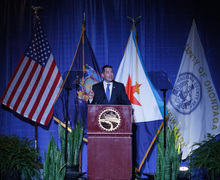Gutierrez: Coordinators, students should make efforts to amplify Blackstone LaunchPad program
The announcement of the Blackstone LaunchPad initiative coming to Syracuse could not have been timelier considering entrepreneurial activity is at its worst level since the government started measuring it.
Although credible sources like Forbes and Inc. magazine report that the United States has hit a record high at 27 million entrepreneurs, Gallup has reported that 20 million of these “businesses” aren’t actually operating and that the number of business startup failures exceeds successes by 70,000 per year. What’s more, the United States has fallen to 12th among developed nations in terms of startup practice.
The Blackstone LaunchPad initiative — a centralized center for student startups — comes to college campuses when the U.S. needs it most. But timing isn’t everything; as great as the program at Syracuse University sounds, there are steps that both coordinators involved in the program and students can take to make the most of what it can offer.
LaunchPad organizers should mirror other successful approaches on campus and amplify them on a level that can support all students.
The Martin J. Whitman School of Management’s entrepreneurship program isn’t ranked among the best in the country for nothing. Each year, the school’s biggest startup program, the Couri Hatchery, helps more than 100 student businesses develop. The Whitman School also offers a laundry list of other university-wide competitions and programs for startups — including the student-run firm Consurtio — that have gained national attention.
The S.I. Newhouse School of Public Communications, School of Information Studies and School of Law also offer quality startup platforms for students. SU’s LaunchPad program’s ability to reach its potential will rest on its very capacity to maximize the strengths of each college.
If it can do this, the university’s programs “will complement one another and make one another better,” said Alexander McKelvie, chair of the department of entrepreneurship and emerging enterprises in the Whitman School. He added that the program should help students set a strong foundation to be successful in their future projects through one-on-one mentoring and consulting, similar to what other colleges on campus offer.
The LaunchPad program should also encourage female entrepreneurship. In addition to the national pay gap, in which women only earn 77 percent on average of what men earn, just 10.6 percent of women-owned businesses employ individuals other the owner themselves.
The Whitman School’s WISE program — Women Igniting the Spirit of Entrepreneurship — would be an excellent model for the entrepreneurial program to build upon in valuing women-led initiatives. Greater female exposure to entrepreneurship could pay dividends in the quest for pay equity, as women will have more control over their earnings if they’re running the enterprises they’re a part of and learning the ins and outs of leadership.
Students can also play a role in helping to maximize the program. All students should at least consider learning more about getting involved in campus entrepreneurial programs. College is often cited as the best time to experiment with startups because it’s low-risk and failures only act as invaluable lessons.
Whether a student’s business ultimately operates long-term or not is, quite frankly, irrelevant. What’s far more significant is the entrepreneurial mindset that descends from pursuing creative projects such as starting a business.
The process develops creative problem solving, collaboration and an ability to adapt, skills today’s hiring managers are looking for.
Matthew Gutierrez is a freshman journalism and entrepreneurial management dual major. His column appears weekly. He can be reached at mguti100@syr.edu and followed on Twitter @MatthewGut21.
Published on November 1, 2015 at 9:54 pm





